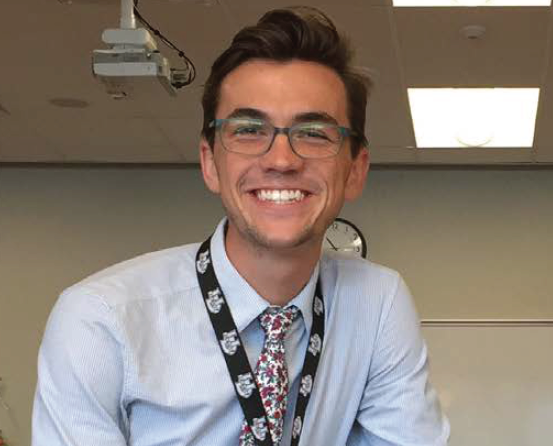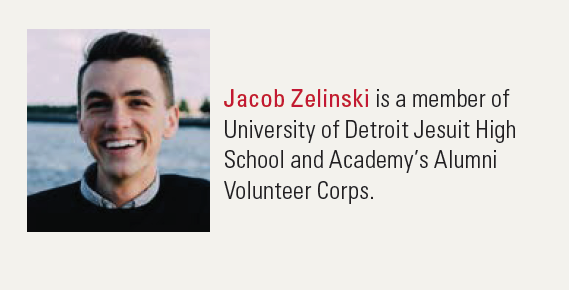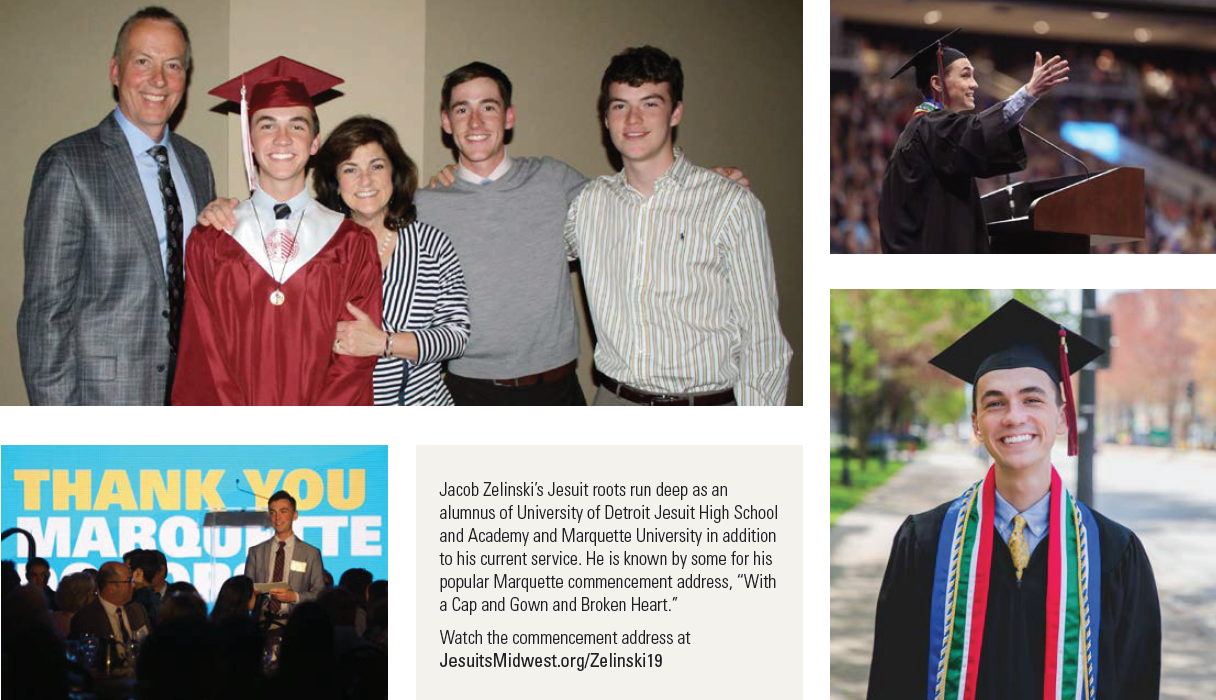
By Jacob Zelinski
In the fall following my college graduation, I have found myself back in high school. From stimulating conversation about early 20th century American literature and the theology of racial justice to questions about grammar, cross-country practices where 14-year-olds call me “coach,” to summer reading tests—it has been quite the readjustment and quite the privilege.
I have found myself roaming and working in the halls of my high school alma mater because I applied—and was fortunate to have been accepted to—the Alumni Volunteer Corps (AVC) at the University of Detroit Jesuit High School and Academy (U of D Jesuit), modeled after the Jesuit Volunteer Corps. In other words, I am back at U of D Jesuit because I wanted to be back, because I asked to come back, to come home. And thank God I did.
In my first weeks back at U of D Jesuit, many of my former teachers—now colleagues—shook my hand, welcomed me, and thanked me, to which I could only respond, “It’s great to be back. Thank you.” I felt starstruck and awkward whenever these interactions occurred, but I meant what I said: It has been great being back, teaching eighth and ninth grade English, coaching cross-country, advising students to pull up their ties and tuck in their shirts, standing in a lunch line next to a 16-year-old who doesn’t know I’m just as nervous as he is, and bearing witness to the greater glory of God at work in the young minds of the students I share the classroom with and in the faculty, staff, and parents I interact with on a daily basis.

So it’s tough for me to accept that what I’m doing is “service” work or some sort of sacrifice: I am here because I am able to live a year off of a meager stipend pay. I am able to begin student loan payments without any expendable income to match. I am able to rest assured that—should I need—I have family throughout Michigan and beyond who would open their doors, wallets, and refrigerators to me. I am able to remove myself from the pace of the capitalist society in which I finished my degree in with very little concern or fear of retribution.
What makes this experience a year of service, then? The fact that I’m enjoying what I’m doing? (Should work not be enjoyable?) My bank account? The fact that I may only be in this position at this school for 11 months? Perhaps. Yet, I know that I am working. I know that being at U of D Jesuit is my full-time job: I am waking up early and sleeping too little, handling responsibilities and setting goals, analyzing performance, and working closely with a mentor to better my teaching abilities. I become exasperated often, have a plethora of questions for each new situation I find myself in, and strive to reach and achieve and fall and pray and grow every day— and so does everyone else.
Some may call what I’m doing a year of service, a gap year, a year off, or a year to build my resume, but I’m more inclined to call it my job.
Our work is our service, and our service is our work. In a culture obsessed with labels and compartmentalizing, we have decided that joining a corps after you graduate is not work, but a service, and that getting your dream job at the hospital downtown is not a service, but a profession. A career.
And I refuse to accept that.
At least 10 times a school day, I am struck by a profound, inarticulate gratefulness to be where I am: in an entirely familiar place with a multitude of old friends, yet with a completely changed perspective, heart, faith, and mind. I am being afforded the opportunity to be on the other side of Jesuit education for the first time in my life, and I’m learning just as much as I would be if I were still a student.
I am surrounded by some of the most hardworking, inspiring professionals I’ve ever met (i.e., educators, teachers, school administrators, coaches, etc.), and I am growing at a rate I haven’t experienced since my first year in college. I love my job, and if this is what service is, then I’m happy to serve, too, and cognizant of my ability to do so—my privilege.

New corps members of various organizations across the country and world this fall will be thanked by a variety of community members they work with in the coming months, and while I cannot speak to any other work experience but my own in the AVC program at U of D Jesuit—an experience additionally marked by my whiteness, my queerness, my faith, my education, and so much more—it is my hope that I will not be alone in reciprocating gratitude to those I work with while acknowledging what a privilege it is to be where I am. For “when we give cheerfully and accept gratefully, everyone is blessed” (Maya Angelou).
Return to Jesuits Fall/Winter 2019 Index
